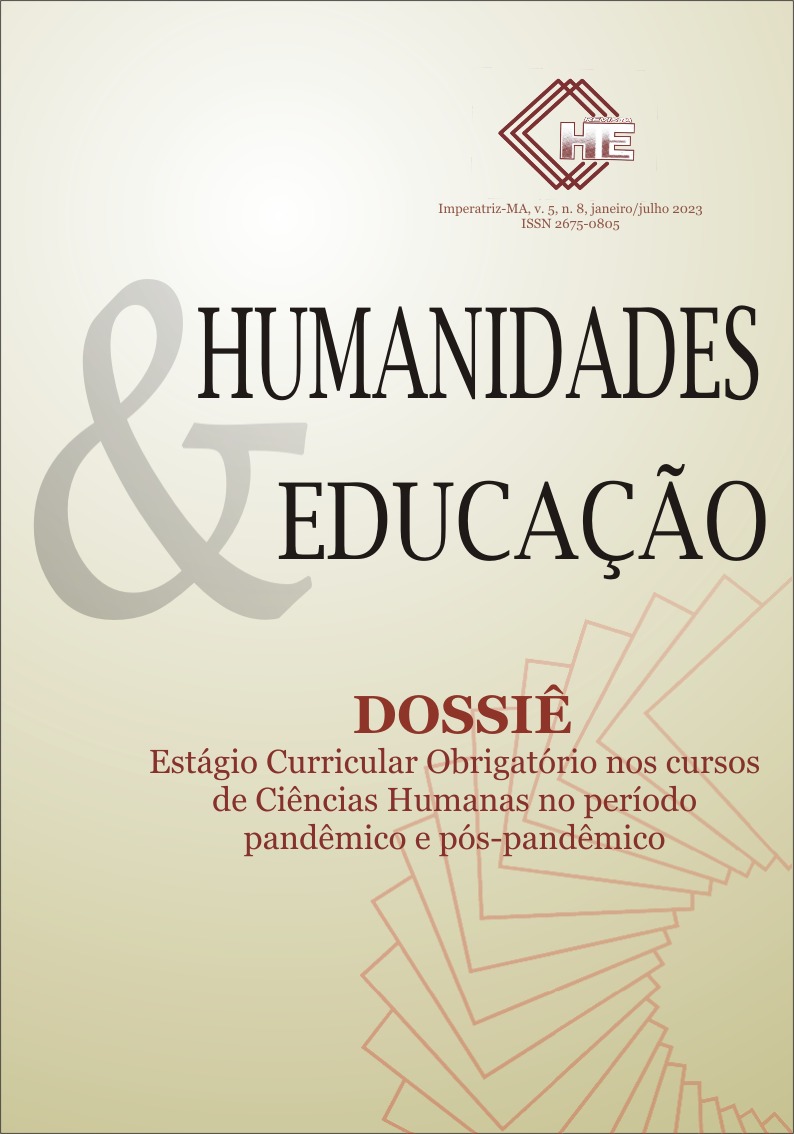CHALLENGES AND POSSIBILITIES OF THE MANDATORY SUPERVISED INTERNSHIP IN MATHEMATICS TEACHING DURING THE PANDEMIC
an analysis from the State of the Art
DOI:
https://doi.org/10.18764/2675-0805v5n8.2023.5Keywords:
Mandatory Supervised Internship, Pandemic, Initial Training, Technologies in EducationAbstract
The Mandatory Supervised Internship (MSI) is an essential component of undergraduate teaching courses, which is configured as an educational-formative act developed in a school environment. This internship covers observation to practice in the teaching and learning process in Basic Education. In this study, a methodological approach was carried out that included documentary and field research, as well as a Systematic Literature Review (SLR), of the State of the Art type (ENS; ROMANOWSKI, 2006). Scientific articles deposited on the Capes journals platform were analyzed from 2020 to 2022, with the aim of identifying gaps and possibilities generated by the Mandatory Supervised Internship in Mathematics Teaching at the Federal Institute of Education of Piauí (FPI), considering the experiences of the 9th period during the Covid-19 pandemic. The results indicated challenges faced by research participants during the completion of the internship and the need to rethink teacher training, adopting pedagogical strategies and digital technologies to make the learning process more dynamic, interactive, and meaningful. These reflections are fundamental to thinking about new perspectives for teacher training in the future, especially in the context of new technologies.
Downloads
References
AMESTOY, Michel Bordoli; POSSEBON, Natália Borba. A importância do estágio no desempenho da docência. Revista do Centro de Ciências Naturais e Exatas, v. 3, n. Ed. Especial - XII EIE- Encontro sobre Investigação na Escola, 2016, p.278– 281.
BRASIL. Ministério da Educação. Lei 9.394, de 20 de dezembro de 1996. Estabelece as Diretrizes e Bases da Educação Nacional. Brasília, 1996. Disponível em: <http://www.planalto.gov.br/ccivil_03/leis/l9394.htm>. Acesso em: 06 de abril de 2023.
BRASIL. Base Nacional Comum Curricular. Brasília: MEC, 2017. Disponível em: <http://basenacionalcomum.mec.gov.br>. Acesso em: 06 de abril de 2023.
CRISONI, Karine Alves Teixeira; SENA, Dalila Maitê Rosa. Percurso formativo em tempos de pandemia: a integração das tecnologias e construção de novas formas de ensinar. In: XV Congresso Nacional de Educação – EDUCERE. Anais [...]. Curitiba: PUC do Paraná, Curitiba, 2021.
COSTA, Ivanilson. Novas tecnologias e aprendizagem. 2a edição. Rio de Janeiro. Wak Editora, 2014.
ENS, Romilda Teodora; ROMANOWSKI, Joana Paulin. As pesquisas denominadas do tipo “estado da arte” em educação. Revista Diálogo Educacional, Pontifícia Universidade Católica do Paraná, v. 6, n. 19, p. 37 50. setdez, 2006.
FORMOSINHO. João. Formação de Professores. Aprendizagem profissional e ação docente. Portugal. Ed. Porto. 2009.
INSTITUTO FEDERAL DO PIAUÍ. Resolução No 18/2015 -CONSELHO SUPERIOR. Aprova o Regulamento de Estágio Curricular Supervisionado dos Cursos Presenciais de Licenciatura do IFPI. CONSUP, No 18 de 06 de novembro de 2015.
IMBERNÓN, Francisco. Formação permanente do professorado: novas tendências, Cortez Editora. São Paulo, 2009.
KIRCHNER, Elenice Ana. Vivenciando os desafios da Educação em tempos de Pandemia. In: PALÚ, J., SCHÜTZ, J. A., MAYER, L. (Orgs.) Desafios da educação em tempos de pandemia, Cruz Alta: Ilustração, 2020, p. 45-53.
MORAN, José Manuel. et al. Novas tecnologias e mediação pedagógica. 21a edição. Campinas: Papirus, 2013.
MORAES, Roque; GALIAZZI, Maria do Carmo. Análise Textual Discursiva. 3ªEdição Revista e Atualizada, Ijuí: Unijuí, 2020.
PIMENTA, Selma Garrido; LIMA, Maria Socorro Lucena. Estágio e Docência. 6 ed. São Paulo: Cortez, 2014.
TARDIF, Maurice. Saberes docente e formação profissional. Vozes, 2002.










